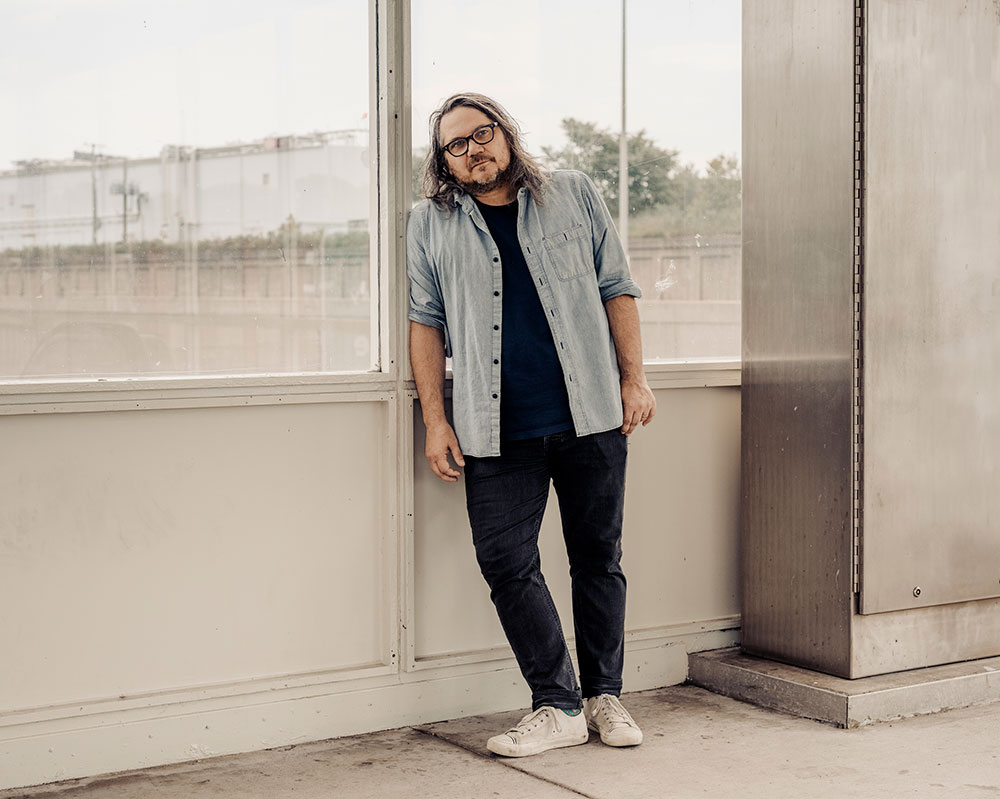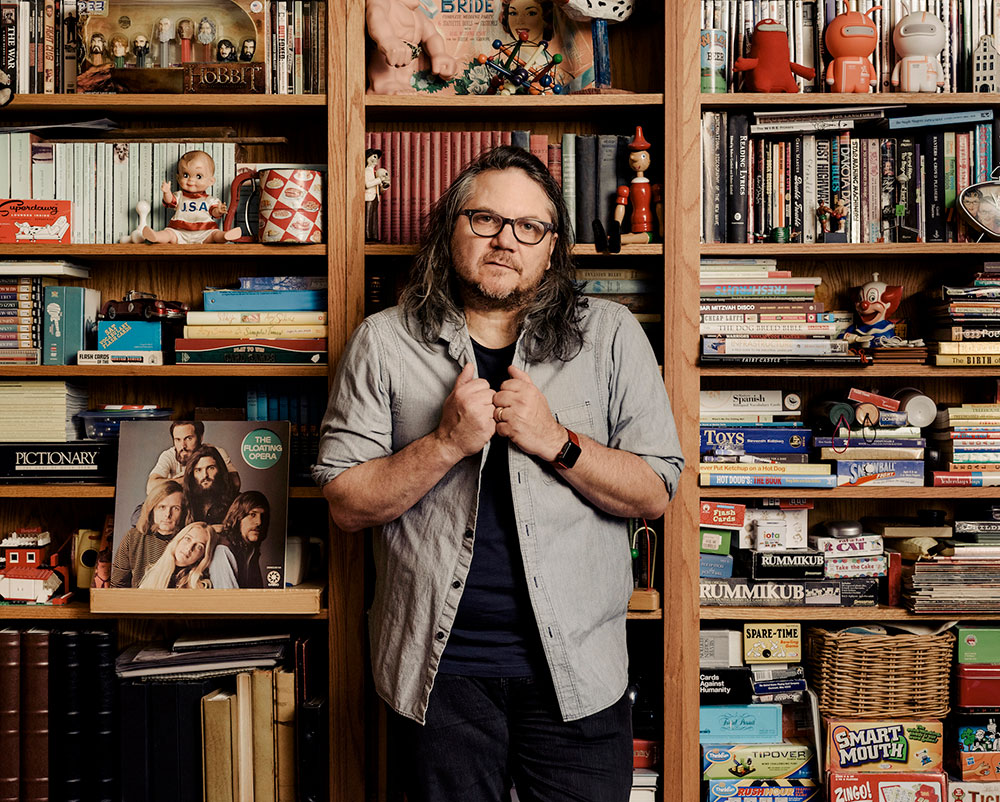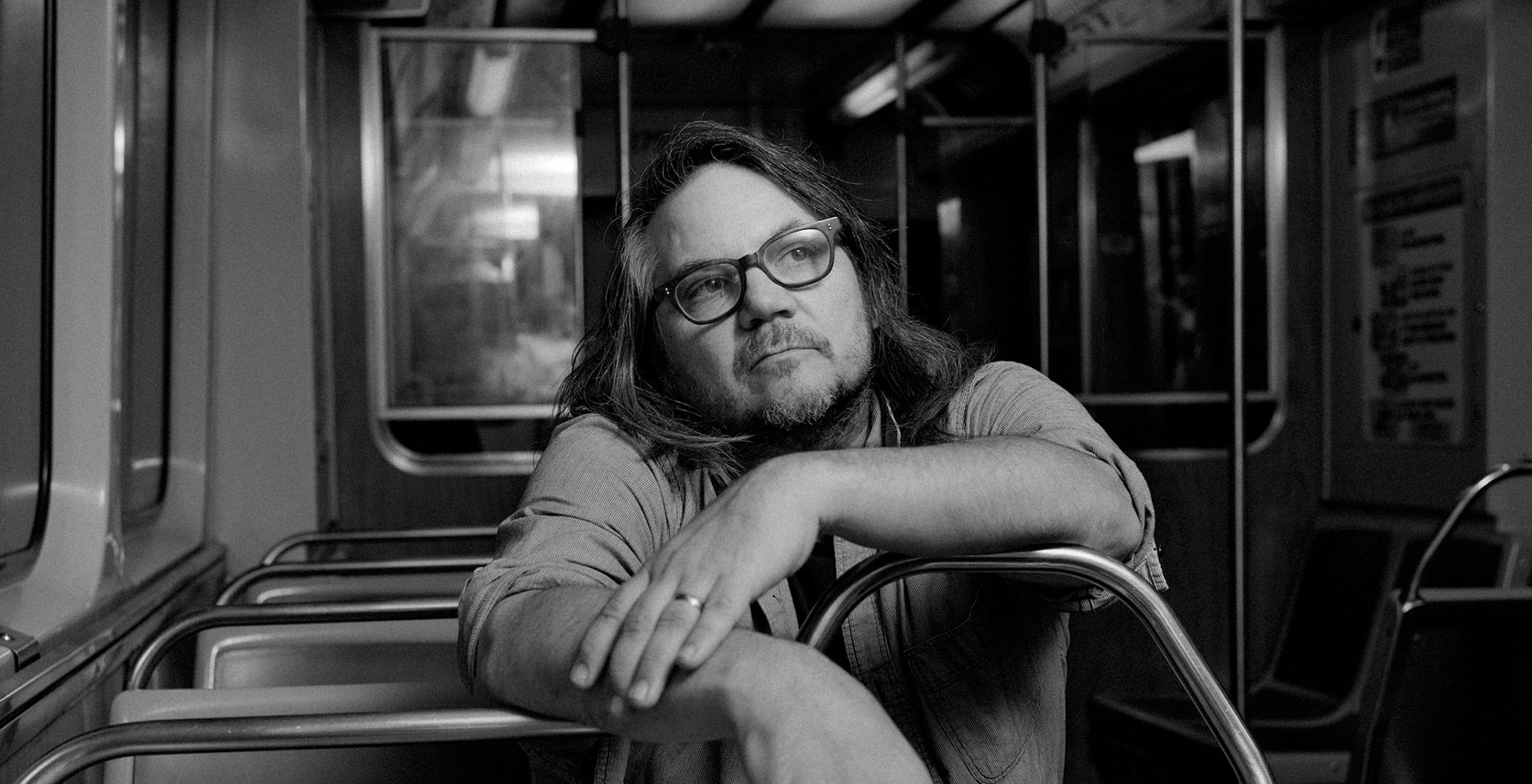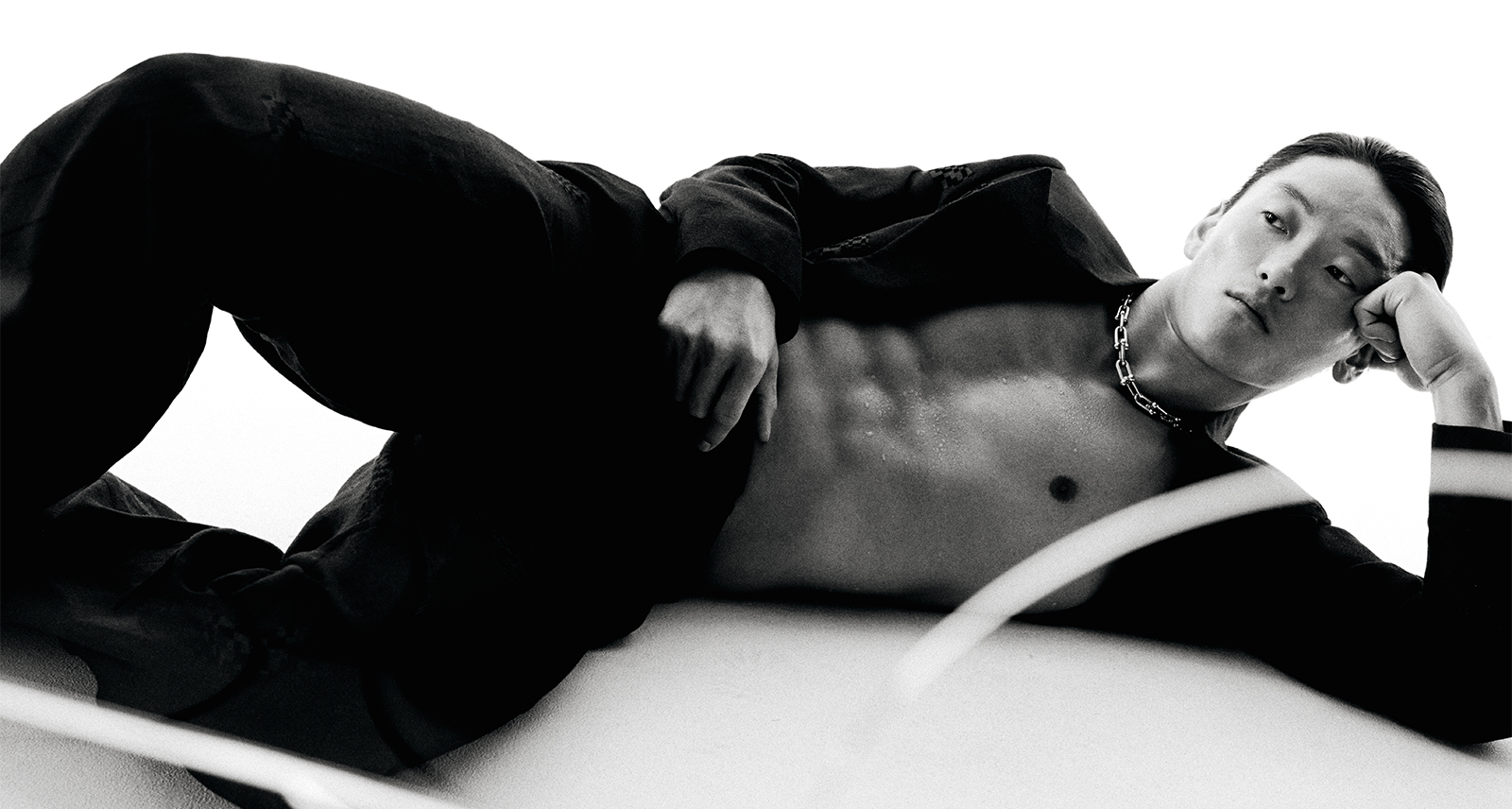Jeff Tweedy on Addiction, Anxiety, and All the Fans Who Wish He’d Do Drugs Again
“No writer ever becomes great until they’ve been greatly hurt.” Jeff Tweedy hates this apocryphal Hemingway quote. The Wilco frontman grew up seeing it scrawled on his brother Steve’s bedroom wall, often worrying about what sort of pain he’d have to endure in order to succeed as an artist. In his new memoir Let’s Go (So We Can Get Back), Tweedy even blames the quote for “damaging” Steve, who has authored several unfinished novels and refuses help for a drinking problem. “To exalt an artist’s suffering as being somehow unique or noble makes me cringe,” he writes.
Of course, it wasn’t too long ago that Tweedy himself was the tortured artist poster boy. At the turn of the century, he was hailed as alt-country’s great iconoclast — a sad rock dude of the highest order, who would guide Wilco through several drug-addled creative reinventions, singing songs about wanting to break your heart. But after Tweedy sought treatment for depression, anxiety, and painkiller addiction in the mid-aughts, fans noticed a shift in his music. It was a little happier, more laidback. Pitchfork even went as far as labeling it “dad rock.” It hasn’t been everyone’s bag.
Well now Tweedy’s putting his haters on blast. His memoir and accompanying solo album, WARM, constitute a critically bulletproof takedown of the tortured artist trope. On both paper and record, he writes openly and honestly about his family, fatherhood, his struggles with addiction, and the reactions to his sobriety. It may well be the most candid he’s ever been. “Now people say, ‘What drugs did you take, and why don’t you start taking them again?’ he gently sings on one song. “But they’re not my friends. And if I was dead, what difference would it ever make to them?”’
Thankfully, Tweedy is alive and well. And great as ever.
Your new album and memoir are very personal. I feel like in the past you’ve been more like ambiguous in your songwriting. But this time it’s personal. Why?
Well, I mean, I don’t feel like I have been ambiguous at the expense of having personal connections to my songs, in terms of being emotionally invested in them. But they’ve been a little bit less clear. I guess the process of writing the book made me focus on telling personal stories as clearly as I could paint them, and that kind of bled over into the process of writing lyrics for this record. It was pretty satisfying when I would get something to read the way I wanted it to read in terms of how a story was coming across in the book. And so I pushed myself to be a little bit more clear with the lyrics on this record. But I think any given Wilco record probably has at least a few songs that are from the same place or same desire to reach out and be clearly communicating. Maybe not whole songs — maybe it’s just a line or two that connects me to the personal in all my songs.

In your book you say you used to write songs to yourself, whereas now you want to write songs that speak to the audience directly, telling them what you want them to know about yourself. Is that a harder process?
I did write that in the book, and it’s still hard for me to hear myself say that. It’s a pretty big leap of faith to assume you have an audience. I think I’ve benefitted from not ever being completely sure that that continues to exist. I’m just always afraid that there’s an ego that’s on the verge of getting out of control the second you believe someone’s paying attention, ot that you have a following. But writing a book is a big leap of faith on top of all of that, in that regard. So yeah, I think the spirit of it is very much in keeping with that notion that I trust there might be somebody listening. And here’s what I got! [Laughs.]
Surely by now you must be certain there’s tons of people listening to you.
Well, intellectually or factually, I guess I could look at the reality of the situation and see that people keep buying tickets and showing up, but on an artistic level, they disappear when I’m working. I can’t think about them. You can’t picture what a crowd wants to hear. You can only think of one person at a time. And that’s generally me, you know?
Fair enough. If you think about the audience too much I suppose there’s a danger of pandering to them.
Yeah, I’m not going to make a Wilco record with a focus group. I just don’t have any idea how that would work.
“I’ve survived a lot of things I never thought I would survive. And I’ve built that up as evidence that I have a lot more strength than I think I do most of the time.”
It would be an interesting experiment!
I think Devo did that for a record one time. I don’t think it turned out very well.
In George Saunders’ flattering liner notes for WARM, he writes “the role of the artist is to reach across space and time and console.” Have you found this to be true in your experience?
Well, that’s certainly what lots of my favourite music has done. It’s come to me years and years later, decades later, from all parts of the world. So I mean, that’s literally how it works, to me. [Laughs.] My feeling is that art’s highest aspiration is to make other people want to make art. If you make something that inspires someone else to create, that’s about as good as you can do, in my opinion. But at the very least, you should aim for consolation and for some sense that you’re going to provide someone who thinks they’re alone some sense of recognition, in a work of art, that they aren’t. And it could be just one thought that they have and see that someone else has that thought, or something that makes things clearer in a way that feels like they’re being looked after. I think that equation works even if it’s something like the darkest, direst black metal. There are people that hear that and see themselves, or feel recognized or seen. And that’s a consolation. That’s a great consolation.
Well, you’re obviously very open about the mental health and addiction issues that you’ve battled…
I haven’t ever really been very private about it. Any time I’m asked something I try and do my best to answer it. I really do. And since I had my somewhat public stay in the hospital for addiction and depression and anxiety, I’ve been asked about it a fair amount over the years. I feel like it’s a responsibility for anybody who has some public platform to be open in a way that can help destigmatize those issues, because I think one of the primary things that keeps people sick is their inability to reach out and their fear of reaching out for help. Or their lack of trust that there isn’t going to be some more serious consequence from reaching out for help than there already is from suffering the illness itself.
So, you know, it’s always a little bit grotesque to see some celebrity or some person in the public eye parading their struggles with these issues. I can be a little bit cynical about it too, but I don’t know what the alternative is other than to be honest and truthful about my own experiences. You can see how it can be sort of a double-edged sword. I think everybody suffers is all I’m getting at, whether it’s those types of issues or something else. But the specific problem with depression and anxiety and addiction is people’s tendency to keep it to themselves.
Can you expand on how it might be a double-edged sword? When writing you memoir were you worried you might be unintentionally glamorizing drugs at the same time?
Not necessarily that. I just think that all suffering is the same, but it’s all… there’s inequalities to the severity of how… I don’t know. I don’t really know what I’m trying to say. I’m sorry.
Haha! It’s okay.
I just think it can be off-putting. Like, in most cases, I think I take people at face value and I think they’re good-natured and the spirit of what they’re sharing is usually sincere and then there are times where I think people wear some of their issues as a badge of honour and can be perceived as being attention-seeking or for publicity. And I don’t point any fingers or know who I’m even thinking of. But I think that can be counterproductive sometimes.
Well you see these types of issues glamorized all the time in rock music. Sex, drugs, and rock n’ roll, you know? There this notion that the messier your life is, somehow the better the art is. What do you think about that? Do you think your songwriting is different coming from a clean perspective?
I don’t believe that at all. I think people create in spite of those issues. Like I said, I think everybody suffers. I think artists are the lucky ones because they have managed to figure out some way to channel some of that suffering into art. But I think it’s extremely backwards to claim that the suffering itself creates the art, because if that was the case the world would have a lot more fucking art in it. [Laughs.] So I think it’s it’s absurd and it does a lot of damage to perpetuate that mythology, from my perspective. That’s all I have to say about that.
We’d have a lot more artists alive today if it weren’t for that mythology…
Well, you don’t get a lot of ink that says, “So-and-so is the most well-adjusted artist you’ve ever seen.” You know? That’s not a man-bites-dog story. Theoretically it could be, but it’s not.
Well, the drugs and debauchery create intrigue. At the beginning of your book you tease the reader by saying you write anything about drugs. And then you go, “Of course I’m going to write about the drugs!” People want to read that stuff.
Yeah, it’s a chapter of my life I think is worth sharing and hopefully I’ve shared it in a helpful way. I have had people, believe it or not, come up to me and say, “How old were you when you quit drugs?” And I’ll tell them and they’ll say, “Okay, that’s when I’m going to quit.” Like, no! That’s not the road map! That’s not how it works.
They want to follow your exact addiction trajectory!
Yeah, I mean, that’s just how damaging it can be, you know, for that to be perpetuated. I’m lucky! If someone says that to me, I’m like, “There’s no guarantee you’re going to be okay. I’m lucky I’m still here. Do what you can to get better as soon as you can.”
You get at this stuff in the song “Having Been Is No Way to Be.” You kind of call out the Wilco fans who wish you’d get back on the drugs.
Well, I’ve actually seen that. I’ve seen that in friends. I’ve seen it in record reviews. “I wish Tweedy was back on the pills.” It’s just somewhat humorous to call people out on that. I think it’s kind of sick. [Laughs.] And it’s selfish to paint a picture like that — that “it would be better for me if you were making records like you made when you were miserable.”
What does the title WARM mean to you?
I think it has a lot of different meanings for this record. There’s an effort to make the actual sonic quality of the record feel like an embrace — to have some warmth to it. I think that there’s an openness to the lyrics and openness to the spirit and the way the songs are created and put together, that I hope feels inviting and warm. I like the thought of people feeling like they’re sitting in the middle of it — that people can put themselves in the room with that those performances.
And then there’s also a metaphoric idea of whether there’s a higher power or notion of God that you subscribe to. There’s a general sense that life is worth living that people try and maintain and sometimes you just kind of recognize that it’s there, even if it doesn’t have a name.

It’s something you just feel.
Well, you just get up every day. [Laughs.]
In the book you also use the adjective “warm” when writing about your experience using opiates. You call it a “warm, maternal sense of well-being.” Was that a coincidence?
Well, no. I think that was a legitimate appeal to that particular type of drug or that sensation. And it doesn’t necessarily have to come from some outside substance. I think that as I’ve gotten older and I’ve been able to more and more recognize that warmth coming from within, and be with that — good with it, to feel sustained by it.
So there’s more than one way to get to that place.
I certainly hope so.
And how do you get there these days?
I continue to work at it. I try and maintain some kind of arsenal of things that I’ve discovered work for me over a long period of time. Something as simple as knowing that a walk is going to make me feel a little bit better. Or, for me, primarily it’s channeled into creating and and making songs and coming to the studio every day and even performing. I feel good about myself just being able to get up on stage and and play songs for people. Or, you know, crossword puzzles? I don’t know. [Laughs.] Figure out a whole bunch of shit that you can do that makes you not want to, like, not be here.
There’s a lot of evidence that suggests millennials are the most anxious generation maybe ever. Why do you think that is?
Probably because they’re digital natives and, evolutionarily speaking, I don’t know if we’ve adapted to a virtual world yet or even come close to it. It seems like we’re still in a pure chaos moment of how human beings interact and survive in a virtual world order. You know, having that amount of information surrounding them all at all times doesn’t seem like that would make anybody calm. [Laughs.] I don’t know anybody that feels calmer because they know more shit that’s happening at once.
Do you enjoy touring these days? Is it an anxiety-free experience now?
I can still get nervous and from time to time. It can definitely still be fairly debilitating in the half-hour before the show. But I have a lot more experience in life that says that’s going to go away when I walk up stage. I’ve survived a lot of things I never thought I would survive. And I’ve built that up as evidence that I have a lot more strength than I think I do most of the time. And so, you know, that’s one of the advantages of living longer. [Laughs.]
Just see it through!
The way out is forward. [Laughs.] Last time I checked, time still only works in one direction.










